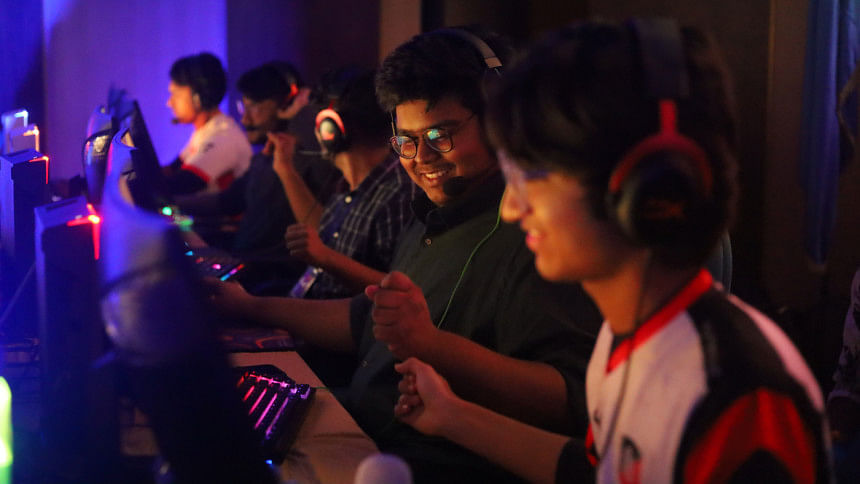What official recognition means for the esports scene in Bangladesh

On July 13, the Ministry of Youth and Sports announced that esports would now be recognised as an official sport in Bangladesh. In accordance with the National Sports Council Act, 2018, esports, as a sport, would refer to any type of game that enhances mental, physical, and intellectual excellence and is disciplined, open, voluntary, professional, and competitive in nature.
This recognition marks a massive turning point for the ever-growing gaming and esports scene in Bangladesh. As such, it shouldn't come as a surprise that the local gaming community erupted in joy following the ministry's confirmation of the matter.
Tanvin 'TripleNinja' Rahaman, a professional Valorant player, says, "It felt like a win, not just for current players, but for the entire community, including fans, casters, organisers, and content creators. For so long, we've worked in the shadows with little recognition or support. Now, we finally have a shot at building something sustainable and respectable in the public sphere."
The announcement was also met with a series of expectations. Most notably, gamers hoped that this recognition would help dismantle a lot of misconceptions that the older generation bears about esports and gaming in general.
"Loads of parents think that esports is just a form of gambling or addiction," says Zahira 'kiwi' Aziz, a professional esports athlete for Team Celestials. "Bringing this industry within legal bounds will hopefully help esports overcome stigmas from parents who think that gaming is merely child's play and a waste of time."
Meanwhile, there are many who hope that the esports scene might get a similar degree of funding and infrastructural support that other established sports in Bangladesh have. Aslam Ahammed Apon, co-founder of RedHawks, the team that recently represented Bangladesh in the Esports World Cup, hopes that the newfound legality of esports as a sport will empower his team to greater heights.
"Right now, the teams we're playing against on the international stage are much more advanced than us," he shares. "Many of them have access to bootcamps and specialised training facilities prior to major tournaments that we don't. Even in terms of branding, these teams are often backed by big sponsors who arrange for their travel, accommodation, gaming peripherals, etc. Following the official recognition, we're optimistic that we'll finally get access to external facilities and benefits that might help us grow further as esports athletes."
And it isn't just players and esports athletes who have high hopes from this update. Regardless of what role they hold, members of the community have been steadily voicing their excitement about what the future might hold. Sanjida "Littolpotat" Afrin, a professional esports commentator, streamer, and content creator, shared her own aspirations that were born from Bangladesh recognising esports as an official sport.
Sanjida is hopeful that the recognition will also help elevate the standard of the broadcasts of gaming tournaments in the country to the point where commentators like her might get the opportunity to go live on television channels on a big scale, as seen in sports like cricket. "If my commentating skills are appreciated on a national level, I would like to transition into being an esports show host as well someday," she says.
Sanjida also emphasises the impact this recognition will have on putting Bangladesh on the map when it comes to esports. "A lot of gaming companies assume that the South Asian region is just made up of India. So, esports stepping into official territories and receiving government support is the first step for us to be recognised globally," she says.
Speaking on further expectations from the government, Md Rashid Uz Zaman, Chief Operating Officer of Zenetic Esports, shares the importance of building an entire esports ecosystem, and not just a tournament-oriented competitive scene.
"By recognising esports as a sport, Bangladesh has opened doors to pivotal opportunities like esports education, job opportunities within esports, youth empowerment, and more, all of which are elements required for the base of an esports ecosystem," he shares. "With support from ministry authorities, I think this process to make esports accessible to everyone – not just esports athletes – gets sped up further."
As a long-time fan of everything associated with gaming, all of the recent strides in esports development excite me. Watching pros battle it out in titles like Valorant, EAFC, and PUBG on national television might not be such a far-off dream anymore. But beyond the hype, this move also gives Bangladesh a real shot at building an esports culture from the ground up, and I am all in for that.
Ayaan immerses himself in dinosaur comics and poorly-written manga. Recommend your least favourite reads at [email protected]

 For all latest news, follow The Daily Star's Google News channel.
For all latest news, follow The Daily Star's Google News channel. 









Comments